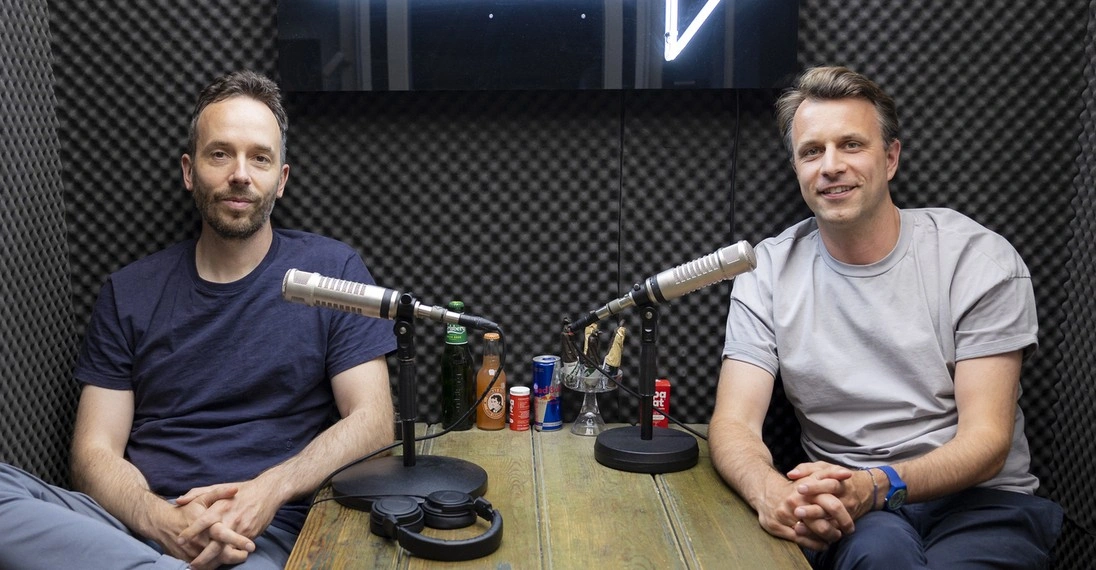Contents
Alongside transport and the construction industry, industry is one of the largest emitters of climate-damaging CO2 in Germany. Decarbonization of this sector will only succeed if there are large quantities of green hydrogen that can replace oil and gas as an energy source and raw material. A huge transformation task – which offers corresponding entrepreneurial opportunities. Nils Aldag recognized this early on and founded Sunfire in 2010. The scale-up produces electrolysis systems on an industrial scale and has thus become a unicorn. And the hydrogen economy is only just getting started. In the OMR podcast, Aldag reports on the tough beginnings, the pioneering role of his company and the potential that hydrogen has for Germany.
Admittedly, the name Sunfire is misleading. It’s not necessarily the first clue that the company behind this name wants to become one of the most ambitious enablers of the coming hydrogen economy. The Dresden-based scale-up develops and manufactures so-called electrolyzers. In Sunfire’s case, these are tennis court-sized systems that use electrical energy to split water molecules. The hydrogen produced in this way will be needed in large quantities for an age of post-fossil mobility and industry.
From misunderstood startup to pioneer
But around 15 years ago, when Aldag and his co-founders started, this was not yet so clear to many. “It was far too early. No one understood what we were planning,” says Aldag about the time around 2010, when Sunfire was founded. In his thesis, the business graduate had looked at the entrepreneurial potential in the field of renewable energies. This is how he came across the topic of hydrogen and specifically e-fuels. These synthetic fuels are mathematically considered to be climate-neutral because they are synthesized from CO2 and only energy from wind or solar power is used. At the time, e-fuels were still considered the great hope of the German car industry, which had long been fixated on the combustion engine.
Due to the poor energy balance compared to purely electric drives, the topic of e-fuels is playing an increasingly insignificant role in the passenger car sector. Sunfire is also now focusing on industry as a buyer of green hydrogen. The demand here is immense. Green hydrogen – that is, hydrogen made from water and not from fossil raw materials – can be used there in many ways. For example, to neutralize the gigantic amount of CO2 that is produced during steel production. Or for the industrial production of fertilizer.
On the way to becoming European champion
To clarify, here are a few figures. Sunfire is neither the only nor the largest company in the field of development and construction of electrolyzers. Giants such as Siemens are also involved. But despite this starting point, the Dresden-based scale-up has now raised over 800 million euros. Sunfire’s investors include Amazon. Two thirds of the funding is venture capital, the rest is public funding. Sunfire’s order books are well filled. And the industry is only at the beginning of its transformation. The capacity to triple production in the short term has already been created, says Aldag.
If the CEO has his way, Sunfire will be a European champion in a few years. He cites the Danish wind turbine manufacturer Vestas as a role model. The company now employs many thousands of people. And is also just one of many companies that owe their rise to a new industrial revolution. Aldag is convinced that the decarbonization of industry offers huge potential to secure prosperity in Europe. And at least for now, the continent is home to many of the world’s leading electrolysis companies.
Lobbying and a bet
The fact that this perspective of a post-fossil industry exists is also the result of Sunfire’s long-standing lobbying in Brussels. The first step was to regulate the fundamentals of the transformation of the energy sector at EU level – from the legal framework to funding. The European legislation is now complete and must now be implemented into national law, explains Aldag. And: “Once that has happened, our bet is that the market will really open up for us on a large scale.”
In the OMR Podcast, Nils Aldag also talks about the role his grandfather played in founding Sunfire, why he is not worried about a possible shift in political majorities, and what needs to happen to prevent the hydrogen economy from falling into the same trap as the once leading German solar industry.
